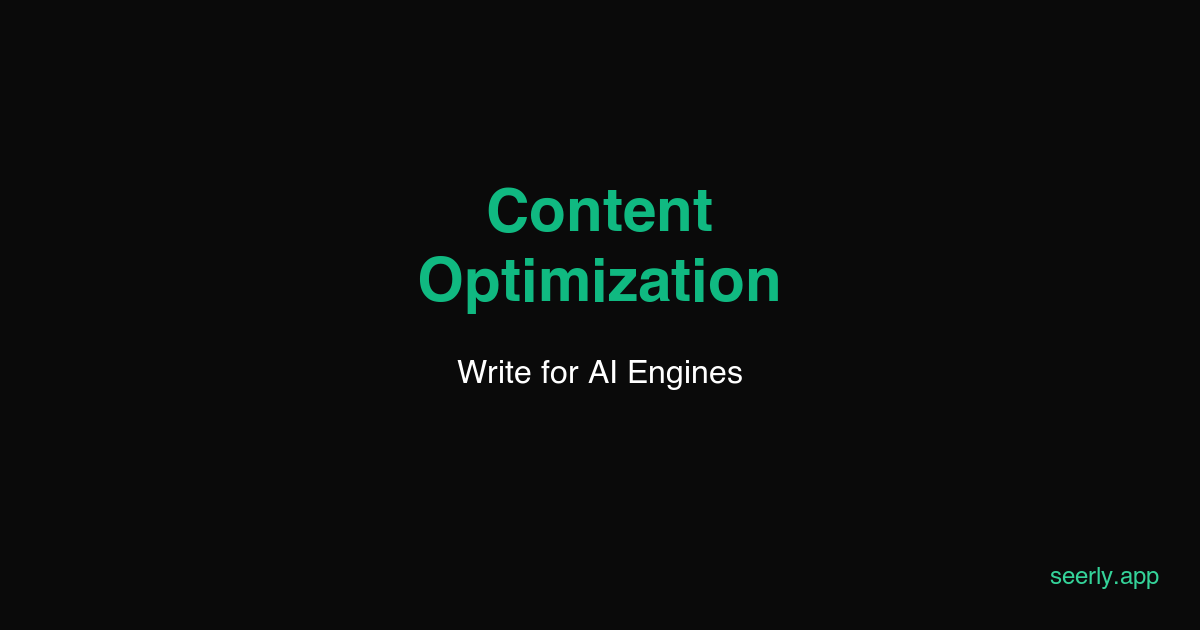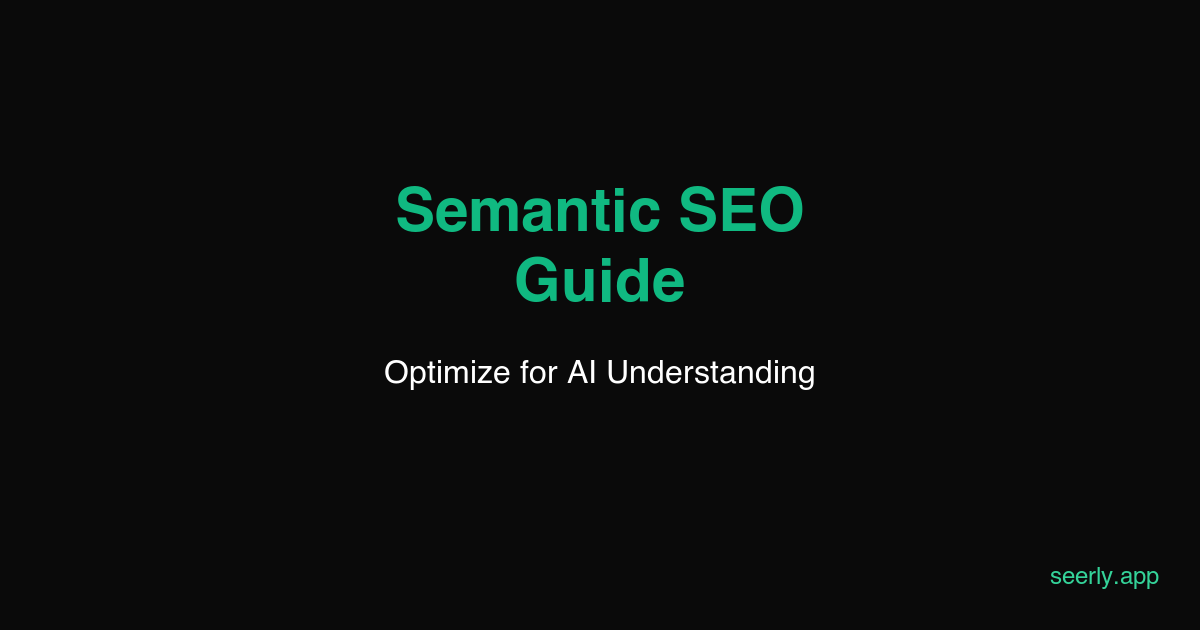Content Optimization for AI Engines: A Practical Guide

There's a moment that happens to every content creator when they realize the game has changed. For me, it was reading through ChatGPT's responses to questions about AI visibility tools. The AI had mentioned several of our competitors, described their features accurately, and even recommended specific use cases for each. But our tool? Not a single mention.
The thing that stung was that our content was technically better from an SEO perspective. Better keyword optimization, more backlinks, higher domain authority. We'd done everything right for traditional search, but the AI engines had somehow missed us entirely.
That's when I realized that optimizing for AI requires a fundamentally different approach. Not just tweaked SEO tactics, but a whole new way of thinking about content creation.
Understanding How AI Reads
Before you can optimize for AI, you need to understand how these systems actually process and evaluate content. And it's quite different from how search engines work.
Traditional search engines are fundamentally about matching and ranking. They match keywords in queries to keywords in documents, evaluate hundreds of ranking signals, and serve up results based on complex algorithms. They're sophisticated, but they're still mechanical pattern matchers at their core.
AI language models actually read and comprehend content, or at least, that's the best way to describe what they do. They understand the meaning of your text, not just the words. They can tell whether you're demonstrating real expertise or just stringing together researched facts. They recognize when you're providing genuine insights versus repackaging information that's already widely available.
This difference means that tricks and shortcuts don't work. You can't stuff keywords or buy your way into AI recommendations. The system evaluates the actual substance and quality of your content, and there's no gaming that.
The Depth Question
One pattern I've noticed is that AI engines consistently prefer comprehensive, in-depth content over surface-level treatments. But "comprehensive" doesn't just mean long. I've seen plenty of 3,000-word articles that say nothing substantial, just padding word count with fluff.
Real comprehensiveness means addressing a topic thoroughly from multiple angles. It means anticipating the follow-up questions readers will have and answering them preemptively. It means providing context for beginners while still offering valuable insights for experts.
Let me give you an example from our own experience. We wrote an initial guide to AI visibility testing that covered the basics: what it is, why it matters, how to get started. It was decent, around 1,200 words, covered the main points. AI engines barely mentioned it.
Then we expanded it into a genuinely comprehensive resource. We added sections on different types of AI engines and how they differ, common mistakes we'd seen clients make and how to avoid them, detailed case studies with specific results, technical implementation details, and a troubleshooting section for common issues. The new version was about 4,500 words, but every word added value.
That's when we started getting cited. The AI engines recognized it as a thorough, authoritative resource worth recommending.
Writing Like You Actually Know Things
Here's something that took me embarrassingly long to figure out: AI systems can detect the difference between content written by someone with firsthand experience and content written by someone who just researched a topic.
The telltale signs are specificity and nuance. People with real experience share specific examples, mention edge cases, discuss what works in some situations but not others, acknowledge trade-offs and complexity, and provide insights that only come from hands-on work.
Generic content, even well-researched generic content, lacks these elements. It states facts and explains concepts, but it doesn't share wisdom that comes from actually doing the work.
I started paying attention to this in our own content. When we wrote about AI testing, did we just explain the concept generically, or did we share specific prompts we'd found effective? Did we acknowledge that results vary by industry and explain why? Did we discuss the failures we'd encountered and what we learned from them?
The more we shifted toward genuine knowledge sharing, the more AI engines cited our content. They could somehow detect that we actually knew what we were talking about.
Structure That Serves Understanding
You still need good structure in your content, but for different reasons than traditional SEO. You're not trying to hit keyword density targets or game ranking algorithms. You're trying to make it easy for AI systems to understand your content organization and extract key information.
This means headings should actually describe what follows, not just incorporate keywords. "How to Choose the Right Project Management Tool for Your Team" is better than "Project Management Tool Selection" because it frames the content in terms of a problem being solved.
It means using formatting intentionally to highlight key points. When you bold a crucial insight or use a blockquote for an important principle, you're signaling to both human readers and AI systems that this particular point matters more than the surrounding text.
It means organizing information logically so concepts build on each other. AI systems understand narrative flow and logical progression. If you jump around randomly between topics, or if you reference concepts before explaining them, you create confusion.
The Question-Driven Approach
One of the most effective structural frameworks for AI-friendly content is organizing around questions. Not because you need to optimize for question keywords, but because it aligns with how people actually think about information.
When someone has a problem or topic they want to understand, they frame it as questions. "How do I improve my website's AI visibility?" "What tools are best for testing AI citations?" "Why do some brands get mentioned more than others?"
Content structured around answering these questions naturally works well with AI engines because it matches how users query them. When someone asks ChatGPT about your topic area, and your content is organized around answering that exact question, the AI can quickly identify your content as relevant and extract the answer.
But there's a subtlety here. You can't just slap "How to" onto every headline and call it optimized. The questions need to be real ones that people actually ask, and your answers need to be genuinely helpful, not keyword-stuffed nonsense.
I've found that the best approach is to actually collect real questions from customers, prospects, social media, forums, and anywhere else people discuss your topic. Then create content that thoroughly answers those questions, using the natural language people use to ask them.
Demonstrating vs. Claiming Expertise
There's a huge difference between saying you're an expert and demonstrating expertise through your content. AI systems recognize this distinction.
Saying you're an expert sounds like this: "As the leading platform for AI visibility testing, we're experts in helping brands optimize for AI engines." It's a claim, and claims don't mean much.
Demonstrating expertise sounds like this: "In analyzing over 10,000 AI visibility tests for 300+ brands, we've noticed that certain prompt structures consistently trigger higher citation rates. Specifically, questions framed around specific use cases rather than generic categories tend to surface more detailed brand mentions. For example, asking 'What's the best CRM for real estate agents?' typically generates more specific recommendations than 'What are good CRMs?'"
See the difference? The second example shares specific insights derived from actual experience. It provides concrete details and patterns that only someone who's done the work would know.
This is hard to fake. You can't research your way into this kind of specific, experiential knowledge. You have to actually do the work, notice the patterns, and share what you've learned.
The Freshness Factor
AI model training data has cutoff dates, but the systems are increasingly enhanced with real-time information retrieval. For topics where currency matters, outdated content loses value quickly.
This creates an ongoing maintenance challenge. You can't just publish great content and forget about it. You need to keep it current, updating statistics, examples, and recommendations as the landscape evolves.
I learned this lesson when several of our best-performing articles started getting fewer citations. The content quality hadn't changed, but the examples had become dated, the tools we referenced had been updated, and some of our advice no longer reflected current best practices.
After updating these articles with current information and noting what had changed since original publication, we saw citation rates recover. The AI engines value and trust content that's demonstrably kept up-to-date.
Writing Style That Works
One surprising finding is that conversational writing style often performs better with AI engines than formal, business-speak content. I think this is because conversational content tends to be clearer and more direct.
When you write conversationally, you naturally use simpler sentence structures. You define jargon instead of assuming knowledge. You use examples and analogies to explain complex concepts. You ask questions and answer them.
All of this makes content easier for both humans and AI systems to understand. Formal business writing often obscures meaning behind unnecessary complexity and jargon. It mistakes complexity for sophistication.
This doesn't mean dumbing down your content or avoiding technical topics. It means explaining things clearly, defining your terms, and assuming your reader is intelligent but not necessarily knowledgeable about your specific domain.
Building Topical Authority
Individual pieces of great content help, but comprehensive topical coverage makes a bigger impact. AI systems recognize when a website demonstrates consistent expertise across a topic area.
This means creating interconnected content that covers your domain thoroughly. You write about the core concepts, the advanced techniques, the common problems, the edge cases, the tools and technologies, and the strategic considerations. Each piece links to related content, building a web of knowledge.
This cluster approach signals to AI engines that you're not just capable of writing one good article. You have deep, comprehensive knowledge of your entire domain.
The challenge is doing this authentically. You can't fake comprehensive expertise by churning out thin content on every tangentially related topic. Each piece needs to maintain the quality and depth that makes it worth citing.
Testing What Works
The only way to know if your optimization efforts are working is to test systematically. Create content, wait for it to be crawled and potentially incorporated into AI training data or real-time retrieval, then test how AI engines respond to relevant queries.
Do they cite your new content? Do they mention your brand more frequently? Has the positioning or context of mentions improved? This feedback loop tells you what's working and what isn't.
I'll be honest: this is a slower feedback loop than traditional SEO where you can see ranking changes within days or weeks. AI training data updates happen periodically, and real-time retrieval systems can take weeks to discover and index new content. You need patience.
But the insights are worth it. When you notice that guides with detailed case studies earn more citations than theoretical explanations, or that content structured around specific use cases performs better than general overviews, you can optimize future content accordingly.
The Long Game
Content optimization for AI isn't a quick win or a hack. It's a fundamental shift in how you approach content creation. You're writing to demonstrate genuine expertise, help real people solve real problems, and provide value that can't be easily replicated.
The good news is that this approach often feels more satisfying than traditional keyword-focused SEO. You're creating stuff you'd actually want to read yourself. You're sharing knowledge generously. You're building something of lasting value.
And the optimization part, paradoxically, becomes easier when you focus on quality. When you actually know your topic deeply and explain it clearly, the AI visibility tends to follow naturally. You're not gaming a system. You're just being genuinely helpful at scale.
That's ultimately what AI engines reward: content that's genuinely useful, demonstrably expert, clearly communicated, and comprehensive in scope. Create that, and the citations will come.


